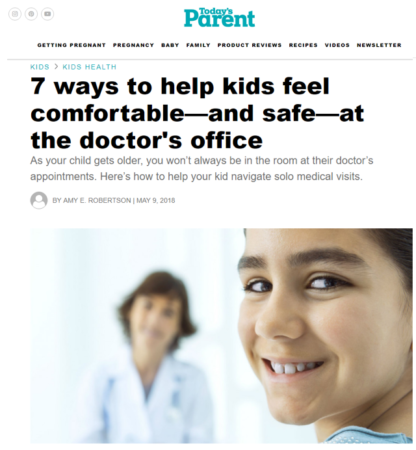As your child gets older, you won’t always be in the room at their doctor’s appointments. Here’s how to help your kid navigate solo at medical visits.
Below is an article that originally appeared in Today’s Parent, a publication based in Canada. The article, “7 Ways to Help Kids Feel Comfortable – and safe – at the Doctor’s Office,” features Darkness to Light’s Program Specialist, Carol Hogue.

After a recent move, I was looking for a new pediatrician. Two actually: I have two teens, a girl and a boy, and each told me they’d prefer to see a doctor of their own gender. It seemed like a reasonable request, but it didn’t seem to be a common request at the first pediatrician’s office I called—at least judging by the receptionist’s indignation.
“The doctor likes to treat all the children in the family,” she told me. “And he has just as many patients that are girls as boys.
I wasn’t casting aspersions. I had called this doctor precisely because he had a good reputation. But in a world of #MeToo and the recent convictions of former USA national gymnastics team doctor and serial child molester, Larry Nassar, empowering my kids at the doctor’s office seemed more important than ever. Respecting their preferences about which doctor they would like to see, especially as they navigated puberty, simply felt like the right first step. So in spite of the receptionist’s protests, that’s what I did.
It’s not easy for kids to feel in control in the doctor’s office, especially in the context of what is an imbalance of knowledge and power. So how can we help our kids to feel safe—and to know what to do, if ever they faced abuse—in this environment?
1. Lay the groundwork
Start teaching children about their bodies and boundaries when they are toddlers and provide choices so that they understand that they have the right to say “no,” says Cora Breuner, a pediatrician at Seattle Children’s Hospital and the chair of the American Academy of Pediatrics’ Committee on Adolescence. They should learn they have the right to accept or refuse physical contact such as hugs or tickles—even from family members and friends—from an early age and learn to trust their gut and talk with a trusted adult, if they feel uncomfortable in any situation.
2. Be one step ahead
Educate yourself about what kinds of exams to expect at the doctor’s office at the different stages of development, as well as the facts about sexual abuse, recommends Carol Hogue, abuse prevention expert with the non-profit organization Darkness To Light.
It’s important to inform your child about what should and shouldn’t happen in the doctor’s office, and what to do if something makes them uncomfortable. “At certain developmental stages, well-child visits will look different,” Hogue says. As boys and girls enter puberty, checking testicles and breast development is a normal part of medical exams.
“A boy should know that the doctor will check his testicles, but that it should be brief and professional and there is a purpose behind it. When it is time for a girl to have a pelvic exam, you can help by verbally walking her through it to let her know what to expect, and by telling her that if something happens outside of that, she should let someone she trusts know about it.”
3.Teach your kid to ask questions
“You can model empowerment in health care by asking the doctor questions during visits like ‘Why are you doing this now? What are you checking for?’” says Hogue. If the physician doesn’t want to answer, you can exercise your right to go elsewhere.
In her practice, Breuner has found that boys have an especially hard time talking with doctors, which often means they stop having check-ups once they leave home. “No one is born knowing how to handle a doctor’s visit,” Breuner says. “The only way you can learn is by doing it. I role play doctors’ visits with my own sons, even now that they are in their twenties.”
4. Prepare your kid for flying solo
Learning the skills to navigate the doctor’s office by pre-adolescence is critical, because eventually, parents won’t be in the room. Why? This is the time when the doctor can ask about sexuality, drugs and alcohol, or abuse. “Kids will open up more when the parent isn’t in the room,” Breuner explains.
To find out more tips, read the rest of the article on Today’s Parent.
Follow us on social media to stay up to date and join the conversation.


Also, be very vigilant if your child is in a children’s hospital. When I was 9 years old, I was hospitalized in the top children’s hospital in Atlanta for strep throat. I had a private room and my mother stayed with me. My doctor was a female.
One day two friendly men came into my room and introduced themselves as doctors. They were wearing stethoscopes and told my mother she would need to step out to the hall while they examined me. My mother left the room and one of the men listened to my heartbeat, then inserted something into my vagina and anus. It hurt, but I was so young and innocent and had no idea what was going on. Then he said the other man was an intern and needed to examine me as well. He did the same thing, they left, and my mother returned.
When I grew up I thought about that incident and discussed it with a therapist who said that was absolutely not a medical procedure and that the men were pedophiles. When I think of how those men took advantage of a sick child, it disgusts and infuriates me. I wonder how many children they abused this way.
Please warn parents to never ever leave their child alone no matter how powerful or friendly the health care worker is.